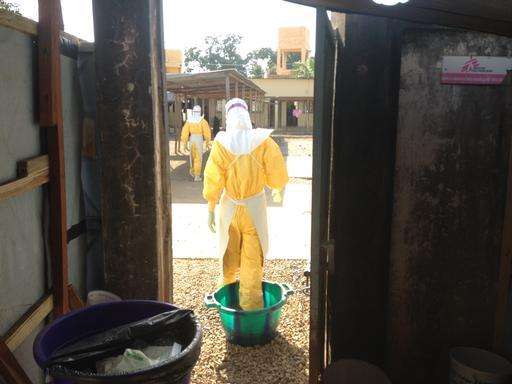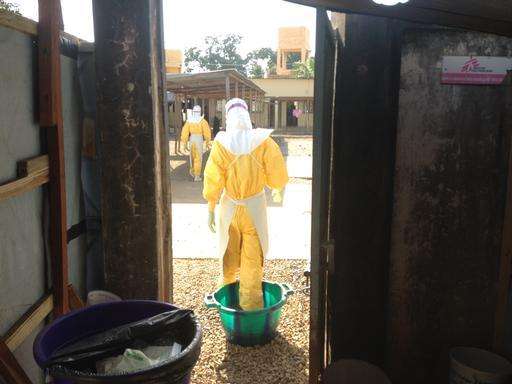Doctors Without Borders/Médecins Sans Frontières (MSF) is deploying more than 60 international staff and 270 Guinean and Liberian staff to respond to the Ebola outbreak in West Africa, which has so far claimed 135 lives according to official numbers. MSF is supporting local health authorities by caring for infected patients and implementing measures to contain the outbreak in three locations in Guinea and two in neighboring Liberia.
As of mid-April, the official numbers from the health authorities in Guinea are 197 suspected cases, 122 of which have been fatal. Similarly, in Liberia, there are 27 suspected cases, of which 13 have been fatal.
Strengthening the Capacity to Care for Patients in Conakry
In a treatment center inside Donka hospital, MSF, in collaboration with the Ministry of Health and the World Health Organisation (WHO), is currently caring for 16 isolated Ebola patients who are isolated in the facility. New patients arrive on a daily basis, which has prompted MSF to expand the capacity from 30 to 40 beds.
“Our priority is to continue to care for the people infected with the Ebola virus,” explains Henry Gray, MSF emergency coordinator in Guinea. “From an epidemiological view it`s too early to say which way the outbreak is going. For us, every new case is a challenge. We will continue to admit new patients until this outbreak is over.”
Several patients have survived the deadly disease after receiving care from MSF medical teams. Ebola has a very high fatality rate, with up to 90 percent of infected patients dying from the disease.
“When I was told I had the virus, the first thought in my head was ‘Am I going to die?’” says a Guinean patient. “But, thanks to the care I received, every day I felt better. By the grace of God, I survived the disease.”
Continuation and Reopening of Activities in Southeastern Guinea
MSF restarted activities last week in Macenta, after operations were temporarily suspended following demonstrations by a small segment of the local population. MSF continues discussions with the local community to counter misunderstandings concerning the disease, and to ensure that they have the best possible information regarding how it is spread and the measures needed to contain it.
In Gueckedou, activities continue with 26 international staff and 156 Guinean staff who work together to fight the outbreak. MSF’s center, with a capacity of 20 beds, currently has 11 patients.
“We know our patients very well—their names; their age; their families; where they live; how they were infected,” says Mano Canton, MSF field coordinator in Gueckedou. “So when there are patients that survive the disease and can see our medical staff without the protective gear and shake our hands, it’s really emotional.”
Positive Cases in Liberia Prompt Extended Response
Following reports of suspected Ebola cases in neighboring Liberia, MSF sent teams to Lofa and Margibi county and to the capital of Monrovia.
In Foya Lofa, close to the Guinean border, four cases have been confirmed, all of which were fatal. MSF is currently constructing a center to be able to isolate and care for cases in the area, and will also train local health staff and make sure that alert systems are in place to refer suspected cases to the center once it is completed.
In Monrovia, MSF supports the authorities and trains medical staff in JFK hospital and Elwa hospital. MSF has also constructed an isolation unit in JFK hospital.
In Margibi County, east of Monrovia, a small isolation unit has been built by a local company. MSF supports the unit with technical expertise and has organized training for local health staff. So far two cases in the county have been confirmed, both of which were fatal.
Identification of New Ebola Strain Has No Impact on Medical Response
A group of international doctors and scientists, among them four MSF epidemiologists, have conducted a study that suggests a slightly different strain of the virus from the previously identified Zaire strain may have been circulating in the region for some time.
“These new findings, published in the New England Journal of Medicine, suggest that the virus was not brought in from any other part of Africa.” says Hilde de Clerck, one of MSF’s epidemiologists and contributor to the study. “However, this does do not have any medical implications for how MSF is responding to the Ebola outbreak in Guinea and Liberia”





